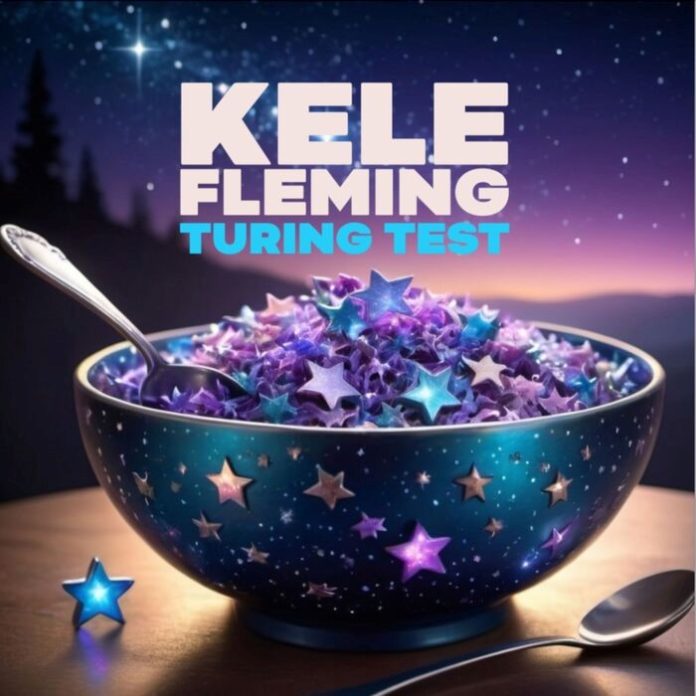It’s rare that a song is named after a test which is “used to assess a machine’s ability to exhibit intelligent behavior indistinguishable from that of a human.” But for Vancouver-born, Victoria-based indie folk pop artist Kele Fleming, there’s proof of a beating heart in the stellar new single “Turing Test.” Simply put, no amount of artificial intelligence or machinery could craft such a pristine piece of work that is as ethereal as it is soulful.
Kele Fleming’s “Turing Test” is a haunting, introspective track that fuses Bruce Springsteen’s heartland rock with the ethereal vibes of Cocteau Twins. It explores AI’s quest for self-awareness and identity, reflecting humanity’s untapped potential and cosmic connection. Through lush, layered sounds and evocative lyrics, the song invites listeners to ponder technology’s allure, identity, and the ecstasy—and risks—of existence.
“The song touches on a number of themes — identity, longing for something you don’t have, and the lure of technology and creation and the potential dangers of such,” Fleming says of “Turing Test.” “In the song, the AI character wants so much to be free and have its own identity. It’s celebrating its uniqueness and the power of its existence without thinking about the impact it may have. At the same time, it’s eating a bowl of stars – a metaphor for devouring the universe and its potential to do damage to the universe as we know it.
“‘Turing Test’ is a reminder and an invitation to embrace that being alive and being human is a miracle. Part of being human is having access to the cosmos. There’s the opportunity for transcendence available to use in relationship to the cosmos and we don’t take it.”
The song is also named after the late British mathematician Alan Turing, who was crucial during the Second World War in deciphering the German Enigma Code which helped the Allies defeat Nazi Germany. Post-war, Turing laid the groundwork for what became computer science, including the idea of a “universal machine” which later was known as the Turing Machine, an abstract model for computers. Fleming says Turing’s life was also inspiration for the song.
“Alan Turing also wanted to be free,” Fleming says. “He was a gay man living in a time when being homosexual was illegal in the UK. He was punished and persecuted by the state for being who he was. So, the song also touches on the imagined pain and longing of Alan Turing to live out his life in peace and embrace his identity as a queer man.” Turing, who died in 1954, was pardoned posthumously in 2013.
“Turing Test,” written and recorded in June 2024 at Vancouver’s The Warehouse Studio, originated from a challenge keyboardist/pianist Matthew Presidente posed to Fleming: “write a new song on the Saturday night between sessions.” After writing the first verse and chorus after taking in a friend’s band’s gig, Fleming finished the song 12 hours later and recorded it with her band. “Everyone got into a magical groove,” she says. “It was pure joy!”
Fleming, who also plays acoustic and electric guitar on “Turing Test,” is accompanied by drummer/percussionist Tony Lee, Scott Fletcher on bass and mandolin, Jonathan Blokmanis on electric guitar and Presidente on piano and keyboards. The single was engineered by Sheldon Zaharko at Zed Productions (with assistant engineer Annie Kennedy) and mastered by Andrew Downton at Railtown Mastering.
“Turing Test” is the latest single for Fleming whose style has been compared to Lucida Williams, Kate Bush, and Neko Case. After fronting ’90s indie group Hazel Motes, Fleming released her debut solo album Songs from the Tinforest in 2006. Additional albums include 2010’s World In Reverse, 2016’s No Static and 2020’s The Song I Will Write For My Whole Life. The artist has played at various Vancouver venues such as The Railway Club and Wise Hall. In 2023, she released a handful of singles including “In My Dream (Mercury Teardrop Remix),” “Vanishing Of Bees,” “Set Me Free” and a remastered version of “Carrier Hotel.”
Now with a deliciously strong single in the “Turing Test,” Kele Fleming is once again proving that nothing can match the creative spark and drive of the human spirit. It’s a track that is incredibly smart while being anything but artificial.







